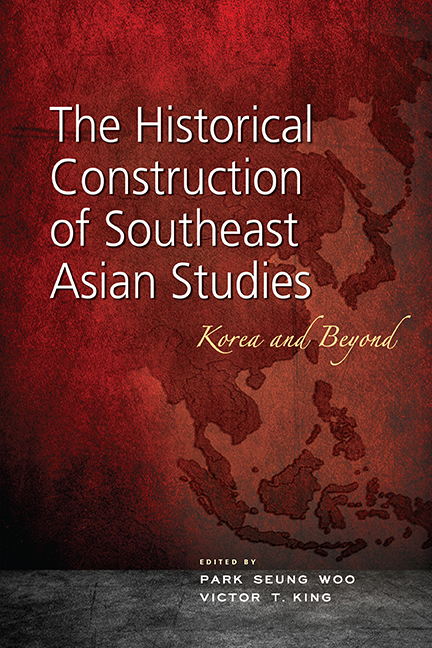Book contents
- Frontmatter
- Contents
- List of Tables
- List of Figures
- Foreword
- Acknowledgements
- About the Contributors
- 1 Introduction: The Historical Construction of Southeast Asian Studies and the Emergence of a Region
- PART I NORTHEAST ASIA
- PART II SOUTHEAST ASIA
- PART III EUROPE
- 8 British Perspectives on Southeast Asia and Continental European Comparisons: The Making of a Region
- 9 It is Hard to Teach an Old Dog New Tricks, But There is Life in It Yet: The Decolonization of Indonesian Studies in the Netherlands
- PART IV AUSTRALIA AND THE U.S.
- Index
8 - British Perspectives on Southeast Asia and Continental European Comparisons: The Making of a Region
from PART III - EUROPE
Published online by Cambridge University Press: 21 October 2015
- Frontmatter
- Contents
- List of Tables
- List of Figures
- Foreword
- Acknowledgements
- About the Contributors
- 1 Introduction: The Historical Construction of Southeast Asian Studies and the Emergence of a Region
- PART I NORTHEAST ASIA
- PART II SOUTHEAST ASIA
- PART III EUROPE
- 8 British Perspectives on Southeast Asia and Continental European Comparisons: The Making of a Region
- 9 It is Hard to Teach an Old Dog New Tricks, But There is Life in It Yet: The Decolonization of Indonesian Studies in the Netherlands
- PART IV AUSTRALIA AND THE U.S.
- Index
Summary
Although the contexts and institutional formats of area studies are in the process of being reconfigured, area studies remains crucial. The study of Southeast Asia is part of a broader issue. Its very existence should neither be hampered by profit-making nor political considerations. Its motivation lies in the central tenet of the pursuit and propagation of knowledge.
(Chou and Houben 2006a, p. 19)INTRODUCTION
In this chapter I shall identify the origins of the making of Southeast Asia and Southeast Asian Studies in the United Kingdom* (with some comparative references to continental European activities) and attempt to establish those factors which encouraged the development of this enterprise and those which stood in its way. In this regard it is important to indicate the main moments, events and persons in this process of construction and provide some evaluation of the contribution which British scholarship has made to this field of studies. A most significant and preliminary observation is that not only is it problematical to define Southeast Asia but it is equally problematical to define precisely what constitutes British scholarship on Southeast Asia in that it was not confined to the shores of the United Kingdom. Of course, scholarship is seldom restricted by national boundaries, but in the particular case of British academic engagement with Southeast Asia we have to take into account the contribution which was made by expatriate researchers and teachers in centres of higher education in the colonies and dependencies. Prior to the 1940s Britain was not entirely dependent on the development of expertise on the Southeast Asian region in the home country. An important training ground for British academics and scholar-administrators was the University of Rangoon and Raffles College in Singapore (Selth 2010; and see Cowan 1980). Following the Pacific War an interesting shift in the locus of scholarship also took place. The British no longer had a base in Burma and the University of Rangoon after 1948, but they continued to have a presence in Singapore and Malaya and also Hong Kong during the 1950s and 1960s when we witnessed the making and consolidation of Southeast Asia as an internationally defined region for scholarly enquiry.
- Type
- Chapter
- Information
- The Historical Construction of Southeast Asian StudiesKorea and Beyond, pp. 265 - 323Publisher: ISEAS–Yusof Ishak InstitutePrint publication year: 2013



